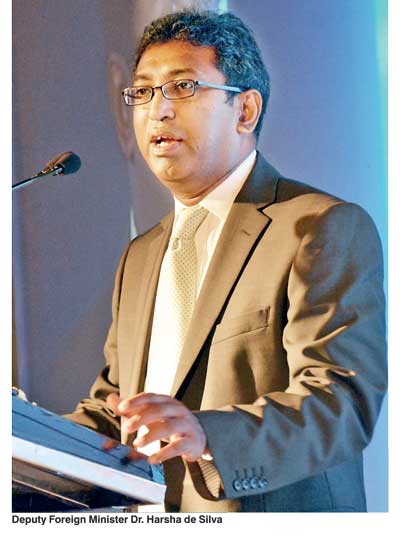Monday Feb 16, 2026
Monday Feb 16, 2026
Thursday, 10 December 2015 00:00 - - {{hitsCtrl.values.hits}}
 Transparency should be the norm, and secrecy the exception, emphasised Deputy Foreign Minister Dr. Harsha de Silva at a meeting on the Right to Information. He was speaking at a consultation organised by the International Centre for Ethnic Studies (ICES) and the Commonwealth Human Rights Initiative (CHRI) held at the ICES Auditorium on Thursday 3 December and Friday 4 December.
Transparency should be the norm, and secrecy the exception, emphasised Deputy Foreign Minister Dr. Harsha de Silva at a meeting on the Right to Information. He was speaking at a consultation organised by the International Centre for Ethnic Studies (ICES) and the Commonwealth Human Rights Initiative (CHRI) held at the ICES Auditorium on Thursday 3 December and Friday 4 December.
The Consultation came a day after the Sri Lankan Cabinet of Ministers gave its stamp of approval to a draft law on the Right to Information (RTI). Enacting a RTI law was part of the 100 day program of the current Government. However, the law did not get passed during the 100 day period.
The Deputy Minister emphasised that this time there is political will to make the RTI law a reality, and that a democratic government cannot survive without accountability. This is the second time in 12 years that the Cabinet has approved a draft RTI law, on the previous occasion Parliament was dissolved before the law could be passed.
The Deputy Minister commented on two challenges to address: ensuring the legislation adequately balances the exemptions against the duty to disclose information; and secondly, the need to create an implementation framework that is effective. He noted that the exemptions to the disclosure of information should be minimised and be specific. The Deputy Minister urged civil society and the media to bring the topic under public scrutiny and make it a subject of public discussion.
The Deputy Minister noted the role that technology plays in implementing the right to information and the importance of using innovative technology in facilitating open government. Sri Lanka has joined the Open Government Partnership (OGP), which requires the government to prepare a two-year action plan for promoting open government.
Public access to information and creating spaces for citizen participation in decision making processes at all levels of government are two major pillars of this worldwide movement, which currently has more than 60 members. Sri Lanka is the only country in South Asia that has joined the OGP, despite the absence of an existing RTI law.
Dr.Jayampathy Wickramaratne, MP and Chairperson of the RTI Bill Drafting Committee, also participating in the RTI consultation, emphasised that the exemptions in the draft Bill must be tested against the constitutional guarantee of the right to information contained in Article 14(A) inserted by the recent 19th Amendment. He encouraged civil society to raises issues of inconsistency with the Constitution with the Government and also in the Supreme Court. Dr Wickramaratne also stressed the importance of taking the draft to non-English audiences for meaningful and widespread consultation.
The RTI consultation, which brought together experts from South Asia and Australia, concluded on 4 December. Experts from South Asia and Australia shared their best practices and experiences on RTI legislation from their respective societies.
The consultation focused on key areas of RTI, including the scope of RTI laws, procedures for accessing information through RTI laws, the exceptions to disclosure, dispute resolution mechanisms in RTI, and the powers of the Information Commission.
An overarching and recurring theme was the need for RTI to be an intrinsic part of the government process, and the need for it to become part of the DNA of democracy and accountable governance.
The success of a RTI law is based on approaching it holistically – a RTI law is not an end in and of itself, rather it is a catalyst to achieving good governance and transparency. For Sri Lanka, what will be required is a paradigm shift; from a culture of secrecy within the civil service and government bureaucracy, still an issue in Sri Lanka, to one of openness. This paradigm shift will be critical to the implementation of the proposed RTI Bill.
The experts cautioned about the categories of exemptions in the draft Bill, particularly about the Attorney-General’s Department communications with other government agencies and public authorities. Exemptions, or reasons for refusing to disclose information, should be the last step in the process of RTI. In particular, the onus should be placed on the decision-maker to justify why information should not be disclosed, rather than implicitly requiring citizens to justify why information should be disclosed.
Ensuring compliance will require a balance to be struck between penalties for non-compliance and incentives to disclose information, including proactively disclosing information.
The experts emphasised the importance of training and capacity building of both the supply side (those who will be responsible for the provision of information) and the demand side (those who will making the requests for information).
The experts strongly emphasised that in the absence of powers to impose monetary penalties, the proposed RTI Commission will lack the teeth to do its job effectively. In addition, there should be a more diverse group of stakeholders involved in the appointment process of the RTI Commission.
The important role of civil society now is to engage in a public discourse on the concerns raised about the draft Bill and use it as an opportunity to seek the necessary amendments. Civil society should also seek to raise awareness on RTI within the larger public.